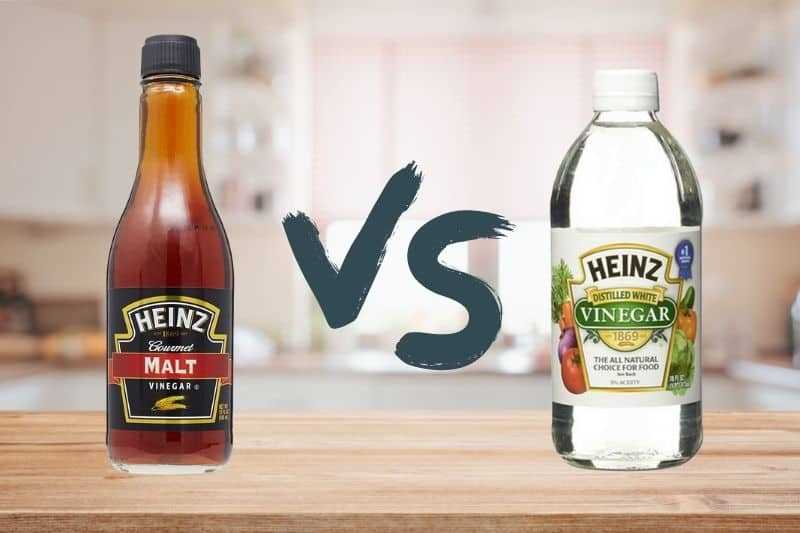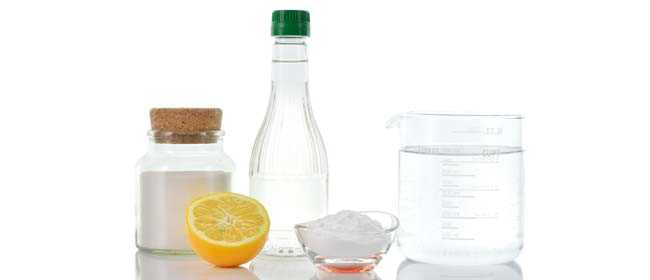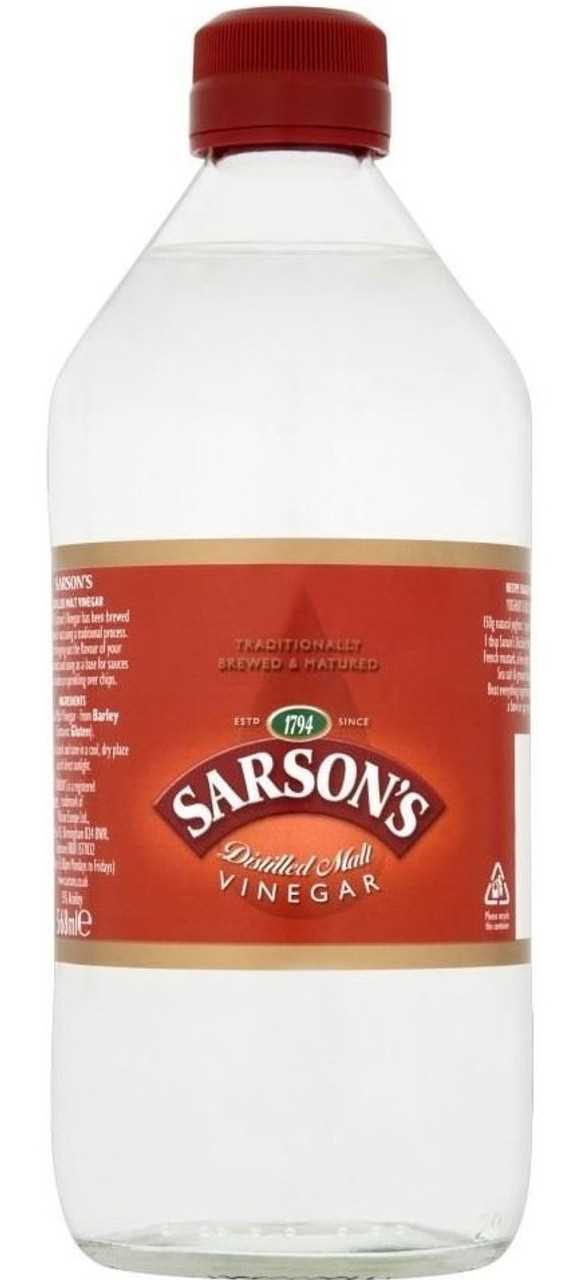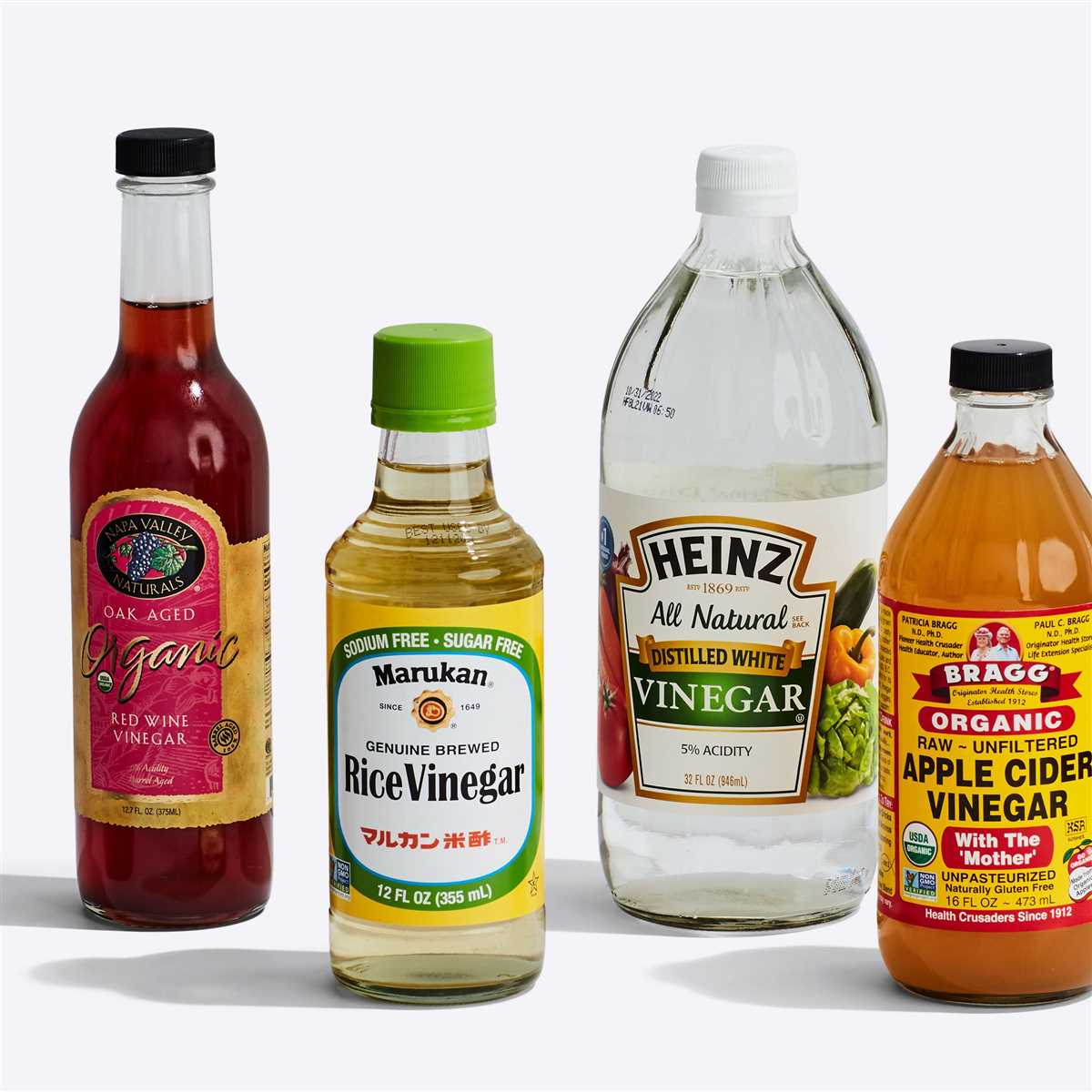




When it comes to vinegar, there are countless options available on the market. Among the many types, white vinegar and distilled malt vinegar are two popular options. However, there is often confusion about whether these two types of vinegar are the same or if they have any differences.
White vinegar, also known as spirit vinegar, is a clear vinegar that is made from distilled grain alcohol. It has a high acidity level, typically around 5-8%. It is often used in cooking, cleaning, and as a natural home remedy. White vinegar has a sharp, tangy flavor that can enhance the taste of certain dishes.
Distilled malt vinegar, on the other hand, is made from malted barley. This type of vinegar has a unique flavor profile, which is slightly sweet and malty. It is commonly used in pickling and as a condiment, particularly in British cuisine. Distilled malt vinegar is typically darker in color compared to white vinegar.
So, are white vinegar and distilled malt vinegar the same? The answer is no. While both are types of vinegar, they are produced using different ingredients and have distinct flavors. It’s important to consider the specific characteristics and uses of each type of vinegar when deciding which one to use in your cooking or cleaning routine.
In this comprehensive guide, we will explore the differences between white vinegar and distilled malt vinegar. We will discuss their production processes, flavors, uses, and more. Whether you’re a food enthusiast, a home cook, or a cleaning aficionado, this guide will help you understand the unique qualities of these two types of vinegar and make informed choices in the future.
Is White Vinegar the Same as Distilled Malt Vinegar?
White vinegar and distilled malt vinegar are two different types of vinegar that are commonly used in cooking and household cleaning. While they share some similarities, there are also notable differences between the two.
1. Source
White vinegar is made from the fermentation of ethanol, which is typically derived from sources like sugar canes, corn, or grains. On the other hand, distilled malt vinegar is made from the fermentation of barley malt or grains.
2. Distillation Process

White vinegar goes through a distillation process, where impurities and particles are removed to create a clear and colorless liquid. Distilled malt vinegar, on the other hand, undergoes a similar distillation process but retains its amber color due to the presence of malt or grain.
3. Flavor and Aroma
White vinegar has a very mild and neutral flavor, making it suitable for various cooking applications. On the other hand, distilled malt vinegar has a stronger, more distinct flavor with a slightly sweet and malty aroma. It is often used in pickling or as a condiment for fish and chips.
4. Acidity Level

Both white vinegar and distilled malt vinegar have high acidity levels, which make them effective cleaning agents. However, distilled malt vinegar tends to have a slightly higher acidity level compared to white vinegar.
5. Uses
White vinegar is commonly used for cleaning purposes, such as removing stains, killing bacteria, and deodorizing surfaces. It is also used in cooking, baking, and salad dressings. Distilled malt vinegar, on the other hand, is often used in pickling, marinades, and sauces.
Conclusion:
While white vinegar and distilled malt vinegar have some similarities, they are different in terms of source, distillation process, flavor, and uses. It is important to use the appropriate vinegar in recipes or cleaning applications to achieve the desired results.
Understanding White Vinegar
White vinegar is a type of vinegar that is clear and colorless. It is made from the fermentation of distilled alcohol, such as corn or grain alcohol. The fermentation process involves the conversion of the alcohol into acetic acid by bacteria.
White vinegar has a strong, sharp taste and a pungent smell. It is often used in cooking and baking as a condiment, marinade, or preservative. It can also be used for cleaning purposes due to its acidity and antibacterial properties.
One of the main differences between white vinegar and other types of vinegar is its acidity level. White vinegar typically has an acidity level of about 5%, which makes it a great option for preserving food and pickling vegetables.
White vinegar can be used in a variety of recipes, such as salad dressings, sauces, and marinades. It can also be used as a natural cleaning agent for removing stains, odors, and bacteria from surfaces.
When purchasing white vinegar, it is important to check the label for any additives or preservatives. Some white vinegars may contain added sugar or artificial flavors, which can affect its taste and quality.
Benefits of White Vinegar:
- Antibacterial properties
- Acidic nature for preservation
- Effective cleaning agent
- Can help regulate blood sugar levels
- May aid in weight loss
Uses of White Vinegar:
- Cooking and Baking
- Food Preservation and Pickling
- Cleaning and Disinfecting
- Beauty and Skincare
Overall, white vinegar is a versatile ingredient that can be used for various purposes. Whether you want to add flavor to your dishes, preserve food, or clean your home, white vinegar can be a useful addition to your pantry.
Discovering Distilled Malt Vinegar
Distilled malt vinegar is a type of vinegar that is made from malted barley. It is commonly used in cooking, pickling, and as a condiment. While it may appear similar to white vinegar, there are some key differences between the two.
Production Process
Unlike white vinegar, which is made from distilled ethanol, distilled malt vinegar is made from malted barley. The barley is first soaked in water and allowed to germinate, which converts the starches in the grain into sugars. The germinated barley is then mashed and fermented with yeast, converting the sugars into alcohol. The alcohol is then slowly transformed into vinegar through a process called acetous fermentation.
Flavor and Aroma
Distilled malt vinegar has a distinct flavor and aroma that sets it apart from white vinegar. It has a slightly sweet and malty taste, with a subtle tanginess. Its aroma is also more complex, with hints of malt and a slightly fruity fragrance. This unique flavor and aroma make it a popular choice in various culinary applications.
Uses
Distilled malt vinegar is a versatile ingredient that can be used in many ways. Here are some common uses:
- As a condiment: Distilled malt vinegar is commonly used as a condiment for fish and chips in the UK. It adds a tangy and slightly sweet flavor to the dish.
- In marinades and dressings: The distinct flavor of distilled malt vinegar makes it a great addition to marinades and dressings for meat, vegetables, and salads.
- In pickling: Distilled malt vinegar is often used in pickling, as its acidity helps to preserve the fruits or vegetables in the pickling solution.
- In sauces and gravies: Its unique flavor profile makes distilled malt vinegar a great choice for adding depth and tanginess to sauces and gravies.
Conclusion

Although distilled malt vinegar and white vinegar may appear similar, their production process, flavor, and uses set them apart. Distilled malt vinegar offers a unique flavor profile and can enhance various dishes and recipes. So, the next time you come across distilled malt vinegar, don’t hesitate to give it a try!
Key Differences between White Vinegar and Distilled Malt Vinegar
White vinegar and distilled malt vinegar are two popular types of vinegar commonly used in cooking and household cleaning. While they share some similarities, there are several key differences between the two:
- Ingredients: The main difference between white vinegar and distilled malt vinegar lies in their ingredients. White vinegar is typically made from fermented corn, whereas distilled malt vinegar is made by fermenting malted barley.
- Flavor: White vinegar has a strong, sharp flavor with a high acidity level, making it suitable for pickling and preserving foods. Distilled malt vinegar, on the other hand, has a slightly milder flavor with a hint of sweetness, making it a popular choice for marinades and dressings.
- Color: Another noticeable difference between the two vinegars is their color. White vinegar is clear and colorless, while distilled malt vinegar has a light amber or golden shade.
- Acidity: Both white vinegar and distilled malt vinegar have high acidity levels, but white vinegar tends to have a slightly higher acidity level than distilled malt vinegar.
- Uses: White vinegar is commonly used for household cleaning, as its high acidity helps remove stains, odors, and bacteria. It is also a popular ingredient in many recipes, including salad dressings and homemade mayonnaise. Distilled malt vinegar, on the other hand, is often used for culinary purposes, such as adding flavor to sauces, pickles, and chutneys.
While both white vinegar and distilled malt vinegar have their own unique characteristics and uses, they can often be used interchangeably in recipes if you don’t mind the slight differences in flavor and color. However, it’s important to note that their varying acidity levels may affect the outcome of certain dishes, so it’s advisable to follow the recipe’s recommended type of vinegar for the best results.
Common Uses for White Vinegar and Distilled Malt Vinegar

White Vinegar
White vinegar, also known as distilled vinegar, is a versatile and commonly used household product. Some common uses for white vinegar include:
- Cleaning and disinfecting surfaces: White vinegar can be used to clean and disinfect various surfaces in your home, including countertops, windows, and floors. Its acidic properties help break down dirt and grease.
- Removing odors: White vinegar can be used to eliminate odors from various areas of your home, such as kitchen appliances, garbage cans, and carpets. It can neutralize strong smells and leave a fresh scent.
- Laundry: White vinegar can be added to your laundry to help remove stains, brighten whites, and soften fabrics.
- Cooking: White vinegar is often used in cooking and baking. It can be used as a natural food preservative, salad dressing ingredient, and flavor enhancer in various recipes.
- Weed control: White vinegar can be used as a natural weed killer. Simply spray it on unwanted weeds or pour it directly on the roots to help eliminate them.
Distilled Malt Vinegar

Distilled malt vinegar, on the other hand, has a slightly different composition and flavor compared to white vinegar. It is typically made from malted barley and has a rich, malty taste. Some common uses for distilled malt vinegar include:
- Pickling: Distilled malt vinegar is commonly used in pickling vegetables. Its strong flavor can add a tangy and savory element to pickled foods.
- Marinades and dressings: Distilled malt vinegar can be used to marinate meats or as a base for salad dressings. Its unique flavor can enhance the taste of various dishes.
- Chutneys and sauces: Distilled malt vinegar can be used to make chutneys, sauces, and condiments. Its robust flavor pairs well with spices and other ingredients.
- Cleaning metal: Distilled malt vinegar can be used to clean and shine metal surfaces, such as brass or copper. Its acidic properties can help remove tarnish and restore shine.
While white vinegar and distilled malt vinegar have some overlapping uses, their different flavors and compositions make them better suited for certain applications. It’s important to choose the right vinegar based on the specific purpose you have in mind. Experimenting with both varieties can help you discover which one works best for your needs.
Making the Right Choice for Your Needs

When it comes to choosing between white vinegar and distilled malt vinegar, it’s important to consider your specific needs and preferences. Both varieties have their own unique characteristics and applications, so understanding the differences can help you make an informed decision.
White Vinegar
White vinegar is a versatile option that is made from the fermentation of distilled alcohol. It has a clear color and a strong aroma, but it has a milder taste compared to distilled malt vinegar. White vinegar is commonly used in cooking, salad dressings, marinades, and pickling. It can also be used for cleaning, sanitizing, and removing stains.
Distilled Malt Vinegar
Distilled malt vinegar, on the other hand, is made from the fermentation of barley. It has a brownish color and a more pronounced flavor compared to white vinegar. Distilled malt vinegar is commonly used as a condiment, particularly in British cuisine. It adds a tangy and slightly sweet taste to dishes like fish and chips, pickles, and chutneys.
Choosing the Right Vinegar

When choosing between white vinegar and distilled malt vinegar, consider the specific purpose you have in mind. If you’re looking for a versatile option that can be used in various culinary and cleaning applications, white vinegar is a good choice. Its mild flavor and clear color make it a suitable option for most recipes.
On the other hand, if you’re looking for a vinegar that adds a distinct flavor to your dishes, particularly in British recipes, distilled malt vinegar is the way to go. Its brownish color and strong flavor can enhance the taste of your food.
Conclusion
Ultimately, the choice between white vinegar and distilled malt vinegar depends on your personal preferences and the specific use you have in mind. Both varieties have their own unique qualities that make them suitable for different purposes. Whether you’re cooking, pickling, cleaning, or simply looking to add some tang to your meals, there is a vinegar that will meet your needs.
FAQ
What is the difference between white vinegar and distilled malt vinegar?
White vinegar and distilled malt vinegar are actually two different types of vinegar. White vinegar is made from distilled grain alcohol and has a clear, colourless appearance. On the other hand, distilled malt vinegar is made from barley, and has a brownish colour. They also have slightly different tastes, with white vinegar being more acidic and distilled malt vinegar having a milder flavour.
Can white vinegar be used as a substitute for distilled malt vinegar?
Yes, white vinegar can be used as a substitute for distilled malt vinegar in most recipes. However, it’s important to keep in mind that they have slightly different flavours, so the taste of the dish may be slightly affected. Additionally, white vinegar is more acidic than distilled malt vinegar, so you may need to adjust the amount used in the recipe.
Is distilled malt vinegar suitable for cleaning purposes?
Yes, distilled malt vinegar can be used for cleaning purposes. Its acidity makes it an effective natural cleaner for various surfaces, such as countertops, windows, and bathroom fixtures. It can help remove stains, kill bacteria, and eliminate unpleasant odours. However, it’s important to avoid using it on delicate surfaces like marble, as the acidity may cause damage.
Can I use white vinegar instead of distilled malt vinegar for pickling?
Yes, you can use white vinegar instead of distilled malt vinegar for pickling. White vinegar can provide the same level of acidity needed for the pickling process. However, keep in mind that white vinegar has a more pronounced acidic taste, so the final flavour of the pickles may be slightly different. You may also need to adjust the amount of vinegar used in the recipe.
Are there any health benefits to consuming white vinegar or distilled malt vinegar?
Both white vinegar and distilled malt vinegar have some potential health benefits when consumed in moderation. They are low in calories and can aid in digestion. Additionally, vinegar has been linked to potential blood sugar control and weight loss benefits. However, it’s important to note that excessive consumption of vinegar can be harmful, and it’s always best to consult with a healthcare professional before making any significant changes to your diet.
Can I use white vinegar or distilled malt vinegar for hair care?
Yes, both white vinegar and distilled malt vinegar can be used for hair care. They can help to remove build-up from styling products, balance the pH of the scalp, and add shine to the hair. You can dilute the vinegar with water and use it as a rinse after shampooing. However, it’s important to avoid getting vinegar in your eyes, as it can cause irritation.













